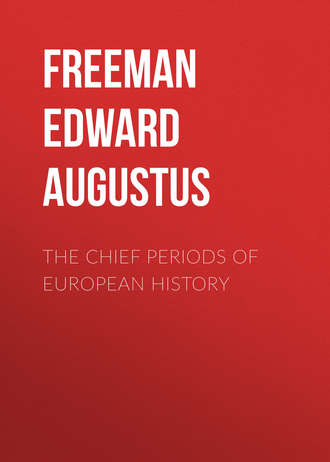
Freeman Edward Augustus
The Chief Periods of European History
It is, as we held in our former course, with that Catalogue, the first written record of European politics, that our survey of Europe before the Roman Power must open. With all who can take a general grasp of history and who understand the nature of evidence, the Domesday of the Empire of Mykênê, puzzling to the mere porer over two or three arbitrarily chosen centuries, commands full belief. We ruled it in our former inquiry to be the highest example of a general rule, “Credo quia impossibile.” In the Catalogue we see the people of many islands and of all Argos, grouped under the Bretwalda of Hellas, already engaged in a stage, and not the earliest stage, of the Eternal Question. Herodotus, who better knew the meaning of the world’s history than the diplomatists of modern days, could point, in a mythical shape indeed, to stages earlier still. Whether there ever was a personal Agamemnôn and a personal Odysseus matters but little; it matters far more that the keen eye of Ælfred, who knew the relation of an overlord and his vassal princes, could see the relation between Ulixes with his two kingdoms and the Casere Agamemnôn of whom he held them. That Casere, kingliest among the kingly, βασιλεύτερος in the throng of βασιλῆες, is already doing the work of a Trajan or a Frederick; he is fighting for Europe on the shores of Asia. The work of Greek colonization has begun; Crete, to be won again ages after from the Saracen, is already won from the Phœnician; Rhodes is already admitted to Hellenic fellowship, to see in after days the might of Antigonos and the might of Mahomet shattered beneath her walls. The southern coast of Asia is still untouched; Milêtos is a barbarian city; but Achilleus has won Lesbos as his own prize, and on the mainland the work is doing which was to make the coasts of the Hellespont and the Propontis a foremost outpost of Greece and Europe, the land which was to witness the first exploits of the first crusaders and to behold the Eastern Rome rise to a fresh life under the firm rule of the Emperors of Nikaia. Deem we as we will as to minuter details, as we have in the Homeric poems our first glimpse of Aryan society in peace and war, so we have in them our first record, if only in a poetic form, of one stage of the great strife which changed the barbarian peninsula of Asia into that solid home of Grecian speech and Roman law which for ages held up against the ceaseless inroads of the Arabian conquerors. To the west, to the north, our range of sight is narrower. No colonist from Argos and its islands has made his way to Italy or Sicily; Akarnania is still part of the vague Mainland, the still undefined Epeiros; Korkyra is still a land of fable on which no settler from Corinth has set foot. But there are signs which already point to the kindred of the nations on both sides of the Ionian sea. The Sikel dwells on both coasts; even of the more mysterious Sikan we get a passing glimpse. The northern coast of the Ægæan is known; but that coast is not yet Hellenic; it significantly sends its warriors to fight on the Asiatic side. Further to the north, further to the west, all is wonder and mystery; we may as well ask whether the poet had any conception of the site of London as whether he had any conception of the site of Rome. The eyes of infant Greece are still fixed on the East; vague tidings had reached her of the wonders of the land by the river Ægypt; the men of Sidon were her visitors, her traffickers, in some sort her teachers. But the wary sons of Canaan were too wise to tell all they knew of Western lands and Western seas. The gold of Tartêssos was as yet for them only; for them only was the precious knowledge that the pillars of Hêraklês – if Greece had as yet heard their name – opened into no stream of Ocean parting the lands of the living and the dead, but into the boundless waters over which it was as yet for themselves alone to spread their sails.
Let us take another glance at the Mediterranean world at a later time, a time when our historic evidence is still meagre and scattered, but when we have begun to leave mere legend behind us. It is one of the gains or losses of the wider study of history that it often teaches us to look at this and that period with different eyes from those with which we naturally look at them when we are engaged only in the narrower study of special times and places. I well remember learning, and I well remember being startled as I learned, from the teaching of Mr. Finlay, that the age which we commonly look on as the most glorious in Grecian history, the fifth century before Christ, was in truth an age of Greek decline. The truth is that it was the greatest age in the history of Athens, and a crowd of causes lead us at every moment to mistake the history of Athens for the history of Greece. What we sometimes fail to see Herodotus saw clearly. He saw that in the general history of the world the age of the Persian wars was, for the Greek people as a whole, the scattered Greek people all over the world, an age of decline. The fact that there was a Persian war, a Persian war waged in Greece, is enough to prove the saying. That fact of itself shows that that process had already begun which is still not ended, the long and gloomy work of which Finlay steeled himself to write the story, the History of Greece under Foreign Domination. It is enough to prove Finlay’s point that Milêtos had learned to groan, as thrice-betrayed Jôannina groans still, beneath the yoke of the barbarian. The periods when Greek influences had most sway over the whole world are two, one earlier, one later, than the more brilliant times of our usual studies. The earlier is the greater; for it is the time when Hellas grew and spread and made wide her borders among the nations, by her own unaided strength, the time when Hellenic colonization carried everywhere, not only Hellenic speech and Hellenic arts, but the higher boon of free Hellenic political life. In the later period Hellenic speech and Hellenic arts are spread more widely than they had ever been spread before; but Hellenic political life is no longer carried with them. The external might of Greece is wielded for her by the kings of the adopted lands; we have passed from Hellenic colonization to Macedonian conquest. In neither of those periods was the most vigorous Greek life to be found in old Greece itself; the most brilliant recorded period of old Greece is the period between the two, the period of our most usual Greek studies. But it was the most brilliant because the outer bounds of Hellas had fallen back before victorious barbarians, and because old Greece rose up in a renewed strength to avenge the wrongs of her colonies and to ward off the like bondage from herself. The Greece of the fifth century before Christ is like the Rome of the fourth century after Christ. Its warfare is essentially defensive; it seldom gains new ground; it has much ado to defend old ground. It gains victories; it wins territories; but the victories are gained over threatening invaders, the territories that are won are won back from the grasp of those invaders. The work of Kimôn, the work of Agêsilaos, answers rather to the work of Galerius and Valentinian than to the work of those conquerors of realms wholly new who made Sicily a Greek and Gaul a Roman land.
It is hard to fix on the exact moment when free and independent Hellas – for remember that wherever Hellênes dwell there is Hellas – had spread itself most widely over the Mediterranean coasts. For boundaries fluctuate, and Hellas still advanced at some points after she had begun to fall back at others. But we cannot be far wrong in picking out some time not far from the beginning of the sixth century before Christ as the most brilliant time of the free Hellênes throughout the world. Then, as Herodotus puts it, all Greeks were still free; it was in the course of the next century that some Greeks were brought under the power of barbarian masters. If some Greek colonies were still to be planted, all the fields of Greek colonization had already been opened. And in most of them the Greek cities were at the height of their power and greatness, positive and relative; they were greater than they were in after days, greater than the cities of old Greece were at the same time. It is one of the truths which it is hardest to take in, that there was a time when Milêtos and Sybaris and Akragas, rather than Athens or Sparta, were the greatest cities of the Hellenic name. The like came again at a later time, when the greatest of Greek cities were Alexandria and Antioch. That the life of Athens and Sparta was the more abiding proves that the Greek was after all more at home on the soil on which he grew to be a Greek; but the fact that, at one time the colonial, at another the Macedonian, cities altogether outshone the older and truer Hellas is a fact which should be ever borne in mind. In the great days of the Greek colonies the greater part of the Mediterranean coasts was divided between settlers from Greece and settlers from Phœnicia. In the eastern seas the Greek had the supremacy; the true life and strength of the men of Canaan had passed away from Sidon and Tyre to the Phœnician cities in the western Mediterranean, to Panormos in the great central island, to Gadeira on the Ocean, to Utica on the Libyan coast, to the New City which outshone her parents and elder sisters, to mighty Carthage, chief and in course of time mistress of her fellows. From the Ægæan islands the Phœnician had withdrawn before the Greek; even in more distant Cyprus the Greek had gained the upper hand. Far to the south, on the Libyan mainland, the fertile coast between the Egyptian and the Carthaginian had beheld the growth of Kyrênê and her sisters of the Greek Pentapolis. The Greek cities of Asia were among the most flourishing in the world; the gates of the Bosporos had been thrown open; the Pontos was no longer the Inhospitable but the Hospitable Sea; if the most abiding seat of Hellenic freedom, Cherson on her Tauric peninsula, had not already sprung into being, the path had at least been opened for her. On the western side of her own peninsula, Greece was creeping up the Hadriatic coast; setting aside later settlements, setting aside doubtful tales of earlier settlements, Akarnania was now part of the Greek mainland, Korkyra was numbered among Greek islands, Ambrakia, perhaps Epidamnos and Apollônia, had begun their course; Greek culture was spreading among the kindred nations; if narrower Hellenic feeling forbade to the Thesprotian and the Molottian any share in the Hellenic name, wider and more liberal inquirers did not deny their right. But, above all, this is the age of the greatness of the Greek folk in the lands west of Hadria, that greatness which so soon dwindled away, and which adventurous kings from Sparta and Epeiros strove in vain to restore. The Phœnician, whose settlements once studded the eastern and southern coasts of Sicily, is now driven into the north-western corner of the island; the Sicilian cities are among the foremost of the Greek name; if Syracuse is less great than she was in days to come, it is because Akragas and Gela have not yet fallen from their first greatness. In southern Italy, alone in lands out of the old home, in a peninsular land recalling the old home, Hellas spreads from sea to sea; the Greater Greece holds the land firmly with her great cities; Sybaris has reached the greatness from which she is soon to fall into utter nothingness; Taras, not yet Latin Tarentum, has begun the long life some traces of which hang about her even in our own day. As for the Greek cities in the Western Mediterranean, Massalia and her fellows, their full day of greatness, their day of widest influence over barbarian neighbours, had as yet hardly come. But it was coming; the work was begun. In that day Hellenic life is fully as vigorous and flourishing in the Western as in the Eastern lands. Continuous Hellas lies between the two, for a moment less brilliant, of less influence in the world, than the two great ranges of Greek colonization on either side of it. But when the whole Mediterranean coast might seem to be divided between the Greek and the Phœnician, two lands stand marked as having supplied no home for the settlements of either. There was the land whose day of greatness had gone by, and the land whose day of greatness was coming. By the banks of the Nile the site of Alexandria still stood unnoticed by all the wisdom of a thousand Pharaohs; the Greek was already known in Egypt as a mercenary; he had not yet come to reign as a Preserver and a Benefactor. By the banks of the Tiber, Rome, perhaps already the head of Latium, not yet aspiring to be the head of the world or the head of Italy, was biding her time; not yet herself conquering or colonizing, but strong enough, along with her valiant neighbours, to keep central Italy as an Italian land, in which neither the men of Hellas nor the men of Canaan should find a dwelling-place.
This then, from the point of view of œcumenical history, is the time which saw the full height of strictly Hellenic greatness, the greatness of Hellenic commonwealths, the greatness of states which were Greek by birth and not only Greek by adoption. Let us pass on to the next strongly marked period, the days, stretching not very much beyond a century and a half, which are undoubtedly the most brilliant days in the life of some of the greatest cities of the elder Hellas, and which have therefore often been mistaken for the whole history of the Greek people. Now, as Herodotus says, we can no longer say that all Greeks are free. In the course of the sixth century B.C. the work of Mummius and Mahomet begins; Greeks now begin to be the subjects of foreign rulers. Barbarian powers such as Greeks had never yet had to deal with have arisen in East and West. Two such powers above all have come to the front, a mighty empire in the East, a mighty commonwealth in the West, an empire and a commonwealth which for some generations were to be names of fear throughout the Hellenic world. On the one side the old barbarian powers of Asia, powers which lay beyond the range of European history, have given way to a new barbarian power which forced itself within the European range, and which we may almost say had a right to force itself. It was not against the Hittite or the Assyrian that the strife had to be waged, but against the kindred Persian. An Aryan people had been misled in their course of wandering; they had strayed into the land of morning; they now turned their faces towards the setting sun, but they turned them only when it was too late, when they had already put on the guise of the lands of their sojourn and could show themselves among their European kinsfolk in no light but that of barbarian invaders. Yet we must pay our tribute to the long abiding national life and national energy which could so often rise again in full freshness after ages of bondage. It was no mean people which could twice spring into fresh being at the preaching of a national religion. It was in truth no small mission in the world’s history that fell to the lot of the Aryan of Persia. Once the worthy rival of Greece, he rose again to be the worthy rival of Rome; like the Greek, he could lead captive successive conquerors; in the grasp of the Saracen, in the grasp of the Turk, his old life could still abide, and, if he bowed to the creed of Arabia, it was only by changing it into a new shape which made it before all things the creed of Persia. The Lydian reaped the first-fruits of Greek subjection; the Persian threatened to turn the whole eastern half of Hellas, continuous and scattered, into part of a world-wide dominion. The King – βασιλεύς – forestalling in that simple word the titles and controversies of days to come, was indeed beaten back from old Hellas; he was beaten back from Europe; he was for a while forced to withdraw his fleets and armies from the Hellenic coasts of Asia. But the fact that he had to be driven back from all of them of itself showed what an enemy it was against whom Greece had now to strive. For a moment Thebes was the willing ally, Athens was the defenceless conquest, of the lord of Susa and Ekbatana. And after all the Persian did cut Hellas short on the side of Asia; he even declared his will as a master in the councils of Europe. A century had not passed since the day of Salamis when, by the peace of Antalkidas, the peace which the King sent down, the Greek cities of Asia, the Greek cities of Cyprus, were formally acknowledged to be the King’s.
In the West meanwhile Hellas had to strive against a rival yet more worthy of her rivalry, not against a barbarian empire, but against a barbarian commonwealth. The old Phœnicia on the Syrian shore had fallen from its glory; its commonwealths, still rich and flourishing, had sunk into dependencies of the Persian power. The great field of Phœnician enterprise now lay in the western seas. One Phœnician city, the youngest of the great Phœnician cities, had risen to a place in the world and the world’s history such as the cities of the elder Canaan had never reached. The New City, Carthage, was now the centre and representative of Phœnician life far more than Sidon or Tyre. Carthage, in after days the rival of Rome, was now before all things the rival of Greece. She was to bring Rome nearer to destruction than was ever done by any other power of the Mediterranean world; she was to destroy for a season, to weaken for ever, more than one of the greatest among the western cities of Hellas. At the head of a mighty following of dependencies of her own race, swollen by barbarian subjects and mercenaries of every race, the Asiatic city planted on the shores of Africa came nearer than any other power of those days to rooting up the elder life of Europe, the life of which first Greece and then Italy was the centre. We do not rightly take in the full significance of the struggle which Greece went through at the beginning of the fifth century B.C. if we do not at every moment bear in mind how the whole Greek folk was attacked on both sides at once. It may or may not be true that Xerxes entered into an actual league with Carthage; it may or may not be true that the fight of Salamis and the fight of Himera were fought on the same day. True or false, both beliefs set forth the true position of the Greek states at that moment, threatened by Persia on one side and by Carthage on the other. The Persian was beaten back; from the actual soil of continuous Hellas he was beaten back for ever. The Carthaginian was beaten back only for a moment; he still kept his hold on Sicily; he was yet to destroy Selinous and Akragas, to come within a hair’s-breadth of destroying Syracuse. In earlier days the scattered Phœnician settlements in eastern Sicily had withdrawn before the coming of the Greek colonists; but now the Phœnician power was wielded by a single mighty commonwealth which held some of its strongest outposts, Panormos at their head, in the north-western corner of the great island. In Sicily things seem to have turned round; the European holds the eastern, the Asiatic holds the western coast. And it is now the masters of the western coast that threaten the eastern.
But the Persian and the Phœnician were not the only enemies against whom the scattered Greek nation had to strive. Foes nearer to the Greek in race than the Phœnician, less widely removed in political and social institutions than the Persian, were threatening the power and the being of one great division of the Greek name. The second of the great peninsulas of southern Europe, the central one of the three, the peninsula which held Rome and Capua and the cities of the Etruscan, was beginning to come to the front in the drama of history. There was as yet no sign that Italy was to be the ruling land of the world; but there were signs that Italy was no longer to be a land in which settlers of foreign races might carve themselves homes at pleasure. The name of Rome was beginning to be heard in Hellenic ears, but it was as yet hardly a name of fear. It was as yet the native races of southern Italy that the Greek cities had to dread, and Rome was for a while the enemy of their enemies. The Persian and the Carthaginian were strictly enemies from without; the Persian was in every sense an invader of the soil of the oldest Hellas; the Carthaginian was at most winning a land in which other branches of his race had once made settlements; but the Lucanians and the other nations of southern Italy were, in the strictest sense, winning back their own land from strangers. When Kymê and Poseidônia ceased to be cities of Hellas, in one sense the boundaries of the civilized world fell back; in another we may say that they advanced, as the nations of Italy began to show that the time was come for the men of the central peninsula to play their part in the world’s history as well as the men of the older peninsula to the east of them.
By the middle of the fourth century B.C. the decline of Greece is, even on the shallowest view, allowed to have begun. But it is commonly held to have begun merely because the Macedonian kingdom was beginning to step into that position of primacy among the Greek powers which had been held at different times by the cities of Argos, Sparta, Athens, and Thebes. And as regards the political life of the great Greek cities, above all, as regards the political life of that Athens which we are so often tempted to mistake for Greece, the change was great indeed, sad indeed. But we must not forget that the political decline of the great cities of old Greece was but one part of the general political decline of the Hellenic people, and also that a large part of old Greece itself looked on the change in quite another light from that in which we are used to look at it from the purely Athenian point of view. With the voice of Dêmosthenês ringing in our ears, it is hard to listen to the calm comments of Polybios, when he hands on to us the traditions of Megalopolis and of so many other cities by whom Philip was looked on as a friend and deliverer, a pious crusader against the sacrilegious Phokian. But yet more important it is to remember that, if old Hellas lost much through the advance of the Macedonian, the younger Hellas beyond Hadria lost immeasureably more through the advance of the Phœnician and the native Italian. Cry after cry for help went up from Italy and Sicily to the motherland in Greece. A series of adventurers, republican and princely, crossed the sea to bear help to their threatened brethren or to carve out a dominion for themselves. Some went to free Greek cities from domestic tyrants, others to free them from the yoke of the advancing barbarian. That men from the motherland were needed for either work shows that the great day of the Western Greeks had passed away, that they could no longer keep either internal freedom or external independence by their own strength. And, dark as is the tale of Dionysios and Agathoklês, we cannot wholly put out of sight that even they had a brighter side as in some sort champions of Hellas against the barbarian. We must not forget Dionysios as the planter of Greek colonies on both sides of Hadria, nor Agathoklês as the man who carried the arms of Europe to the shores of Africa, the forerunner of Regulus and Scipio, of Roger of Sicily and Charles of Austria. But the mission of Diôn and of the nobler Timoleôn, the warfare of the Spartan and the Epeirot, of Archidamos and Alexander and Pyrrhos, showed that the Greeks of the West could no longer stand, even by the help of the Greeks of the old Hellenic lands or of the lands which had become Hellenic by adoption. Their doom was sealed; so before long was the doom of all lands, the lands of the Macedonian and the Carthaginian no less than the lands of the Sicilian and the Italian Greek. But the fall of Macedon and the fall of Carthage were yet far distant; those lands were reaching their highest pitch of greatness at the moment when it became plain that all that was left for the Greeks of the West was to become subjects or dependents of an Italian power.
Another point to be noticed is the close connexion between the destiny of the Eastern and of the Western Greeks. The Spartan princes sought for a career in Italy because, in face of the advance of Macedonia, there was no career left for them in old Greece. Moreover the Epeirot kings Alexander and Pyrrhos are themselves part of the Hellênismos; they are among the chiefest signs that the Hellenic name and culture had spread beyond the genealogical bounds of the Hellenic nation. Their people might have an ancient kindred with the Greeks; they themselves might come of the blood of Achilleus; but they were still, in the wider aspect of the time, Greeks by adoption only. And the career of the Epeirot kings in the West was directly suggested by the career of the Macedonian kings in the East. Their land looked towards Italy and Sicily yet more directly than Macedonia looked towards Asia; and perhaps Alexander, certainly Pyrrhos, sought to found beyond the Hadriatic a Western Greek dominion to balance the Eastern Greek dominion which the Macedonians had founded beyond the Ægæan. So it was not to be. The decree had gone forth that Greece, in her new guise, was to leaven the East, for a while to rule over the East, but that in the West the political power of the Greek race was to die out, that even its intellectual influence was to be indirect, an influence which had to accept Roman masters and disciples as its instruments.
Yet the day was coming when Rome was to rule in the East as well as in the West; she was step by step to draw all the Greek powers, those that were Greek by adoption as well as those that we may call Greek by birth, within the spell of that influence which silently changed from alliance to subjection. The details of that process, the picture of the world into which Rome burst as it were in a moment, the history in short of the third and second centuries, have, in the common course of so-called classical studies, met with a neglect which can be measured only by their paramount importance in universal history. The distinctive aspect of that age I shall have to speak of again. I wish now to point out how rich in political instruction of every kind, rich perhaps beyond every other age of so-called classical times, the age of Polybios really is. The Greek world of his day was made up of an assemblage of states, of every degree of power and of every form of political constitution. There was nothing like it in the earlier days of Greece; there was nothing like it in the after days when Rome practically became the world. But the Greek world of those days gives us a lively image of the political state of modern Europe for some ages past. The political experience of Polybios was immeasureably wider than that of Thucydides; he had in truth an experience fully as wide and varied as that of any modern statesman. Thucydides knew only the independent city, oligarchic or democratic, and the city which would fain be independent but was not. In his day kingship and federation – federation worthy to be so called – were still in the background; they hardly stood forth on the political stage; kingship was not the constitution of any acknowledged Greek power; federation was not the constitution of any Greek power of the first or even of the second rank. But Polybios could study, within the range of Greek or Greek-speaking powers, every form of kingship and every form of commonwealth. There was the national kingship of Macedonia, the king ruling over his own people. There was the local kingship of Egypt, the rule of Greek kings over a foreign nation. There was the Seleukid dominion, fallen indeed from its old greatness, but whose kings still kept up some memory of the position alike of Cyrus and of Alexander, the position of the Great King, the King of Kings, ruling over lands and cities, Greek and barbarian, of every speech, of every form of life, of every kind of relation to the central power. And the Greek city-commonwealth, fully free and independent, was still a familiar form of political life; nor need it shock us that the purest and noblest example of a Greek democracy was now to be found, not at Athens but at Rhodes. But the highest political life of Greece, above all of old European Greece, was now to be found in the federal states, in Polybios’ own Achaia, in gallant and faithful Akarnania, in the adopted Greek land of Epeiros, nay too in after days beyond the sea, among worthy imitators of Hellenic models, in that land of Lykia whose people, in the latest day as in the earliest, stand forth as the worthiest folk of Asia, alongside of the men of Achaia, worthiest folk of Europe. Achaia, Rhodes, Pergamon; it was no mean lesson to be able to study the federal commonwealth, the single city commonwealth, the kingship of a house worthy to reign, each standing forth in a model example of those three several forms of government. In such a system of states as this, instead of the simpler relations of earlier days, we come across all the complications of modern international politics. While the old republican life goes on, we see beside it the working of dynastic interests, the influence of queens and ministers, exactly as in the modern world. Diplomacy has its work to do, and a busy and constant work it is. Nor is the history of these times simply the history of petty states. Not only Macedonia and Egypt, but Pergamon, Achaia, Rhodes, were all great powers according to the standard of any earlier age. They were the leading states of their own world, the chief members of an established system in which each held its place exactly like the states of the modern world. Suddenly a foreign power broke in among them, a power far stronger than any of them, a power which came from another world beyond their range, and which in a moment changed the face of the world into which it entered. The suddenness of this irruption of Rome into the Greek world, the speed with which she sprang at once to the first place in the East as well as in the West, are among the most striking parts of the story. They stand out in marked contrast alike to the slow steps by which Rome had marched to the headship of the West and to the slow steps by which her leadership in the East was changed into direct and universal rule. Next to the delusion that the Empire of Rome came to an end in 476 A.D. stands the delusion that free Greek states came to an end in 146 B.C. This last delusion may be easier to get rid of than the other. The third and second centuries B.C. have at least the advantage of being left pretty clear from the touch of the crammer. It is easier to write on white paper than to make parchment ready for a palimpsest. It may be easier to set forth the true aspect of the age which ruled that Rome should be the head of the world than it is to set forth the true aspect of the age which answers to it, the age which ruled in what shape Rome should still remain the head of the world, though her political dominion over half her provinces was broken in pieces.







